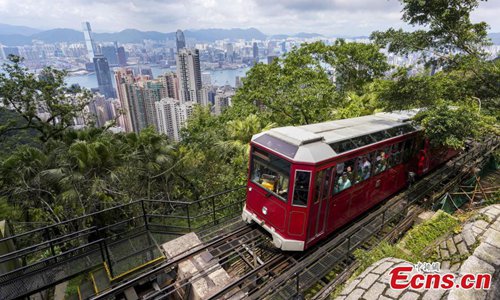HOME >> BUSINESS
Hong Kong remains world’s 2nd most competitive place
Source:Global Times Published: 2019/6/2 19:43:40

People wait to board the Peak Tram service in Hong Kong, April 22, 2019. A project to upgrade the tram will involve a significant investment of HK$684 million, replacing the current tram cars, which have a capacity of 120 passengers, with new 210-passenger tram cars. The first suspension of the Peak Tram service will begin on April 23 and last approximately two to three months. (Photo: China News Service)
The Hong Kong Special Administrative Region (SAR) of China retains its strong economic competitiveness while the US position has slipped due to weaker high-tech exports and other factors. Analysts noted that openness is the essential advantage of the Hong Kong SAR.
"Hong Kong has always been an open and sound market, with its advanced financial services and legal environment, in addition to the economic momentum contained in the Guangdong-Hong Kong-Macao Greater Bay Area," Tian Yun, vice president of the Beijing Economic Operation Association, told the Global Times Sunday.
"By contrast, the US administration's economic policies keep fixating on low- and medium-end industries, which might be in line with its short-term political interests, yet would hurt its cutting-edge sectors in the future," Tian said.
The comment came with a recent report on the competitiveness of world economies, which showed that Hong Kong held on to the second place, helped by its benign tax and business conditions and easy access to financial markets.
Released by the Switzerland-based IMD Business School, the report assessed the competitiveness of 63 economies based on four categories: economic performance, infrastructure, government efficiency and business efficiency. The Hong Kong SAR ranked first in government efficiency and second in business efficiency.
The US dropped from the top to the third spot and switched places with Singapore, mainly due to the diminishing confidence boost of the Trump administration's tax cuts, as well as the negative impact of higher fuel prices, weaker high-technology exports and fluctuations in the value of the US dollar, the report said.
"In a year of high volatility in global markets due to rapid changes in the international political landscape as well as trade relations, the quality of institutions seems to be the unifying element for increasing prosperity," Arturo Bris, professor at the IMD, said in a statement posted following the report.
The US Commerce Department blacklisted Chinese telecom giant Huawei and 70 affiliates on May 15 and banned them from buying technologies or parts from US companies without US government approval.
Given the uncertainty over US policies, and the positive attitude of the Chinese market, it is quite possible that the competitiveness of the US would fall out of the top five next year, Tian said.
Posted in: ECONOMY